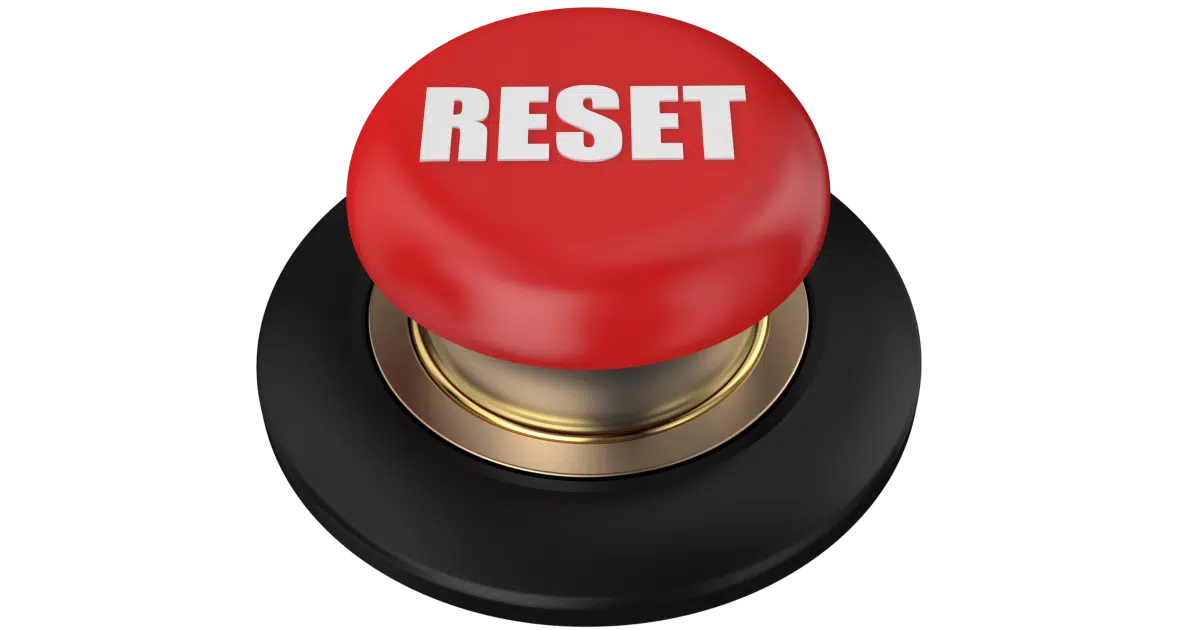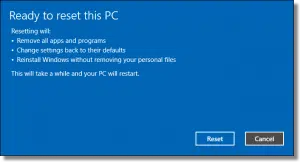There’s no schedule.

Resetting your PC involves backing everything up, reinstalling Windows and applications from scratch, and restoring your data from the backup or elsewhere.
In years past, I advised doing a reset fairly regularly. Recommending an annual reset wasn’t uncommon for active users, including me.
These days, a reset isn’t as necessary as it once was. I’ll review why and when we would want to reset Windows.

Resetting a PC
Resetting your PC gives it a fresh start, clearing out cruft, clutter, and problems. These days, most people may never need to do it. But if your computer feels slow, unstable, or is hit by malware, a reset can help. Sometimes it’s the quickest fix. Of course, always back up first.
Why reset at all?
Like any modern operating system, Windows is unfathomably complex.
Over time, Windows becomes slightly less stable. As updates are applied, old components are replaced, software is installed and uninstalled, configurations are changed, malware is discovered and removed, and so on, the internal state of the system gets messier. Some of it is under Windows’ control, but much is at the mercy of third-party software, like the drivers and applications you install.
The symptoms are subtle. They range from the system feeling slower than it once was to applications not behaving as they should to random crashes and other issues.
A reset starts over with a clean slate, and the process begins again.
That hasn’t really changed. What has changed is that the rate of degradation has decreased dramatically. These days, it’s reasonable to assume that for a casual user, the operating system will remain stable enough throughout the life of the computer itself. A “reset” of sorts happens when the device is eventually replaced.
But, sometimes — particularly for active users who stress their systems in various ways, such as installing and uninstalling lots of different software — a reset might be called for before the computer’s replacement.
Help keep it going by becoming a Patron.
So, how often?
There’s no hard-and-fast answer to how often you should reset your PC.
As I said, it’s possible you may never need to.
I’ll use myself as an example. I used to count on a reset roughly once a year. As you can imagine, I’m a heavy user. I play with a lot of different things and test an assortment of even more. I definitely consider myself at the far end of the bell curve.
And yet, I’ve reset my current desktop — five and a half years old as I write this — exactly once, about a year ago. That’s over four and a half years without a reset.
Your mileage will definitely vary. Rather than looking at a specific timeframe, base it on your system’s performance. At some point, its behavior will reach some threshold and just “feel” like it’s not the machine it once was. That’s a prime time to consider a reset.
Other times to reset
Besides feeling that your machine has slowed down or become unstable over time, there are a few other times when it’s worth considering a reset. Rather than being driven by explicit concerns, these are opportunities to reset the clock.
Considering a new machine? Reset first.
When you’re thinking about replacing your machine, take a minute to see if it’s really as bad/slow/incapable as you think it is. Whatever’s driving you to consider a replacement is also an opportunity to see if your existing machine might feel like a replacement after a reset. While certainly not guaranteed (there are too many variables), it can save you a lot of time and money when it works. And, let’s face it, getting a new machine incurs many of the same “costs” as a reset; you still have to reinstall all your applications and restore/move your data.
Recovering from malware
I’m constantly amazed at the time people spend trying to remove malware from their computers. They’ll spend hours or days downloading assorted tools, running scans, and following sketchy advice — all without a guarantee that the malware is actually removed.
Aside from restoring an image backup taken before the malware arrived1, a reset is quicker. It’s also guaranteed to remove the offending malware. As a bonus, your machine gets to start over with a clean slate.
Not a silver bullet
I don’t mean to imply that performing a reset is some magical silver bullet that will suddenly fix all the problems you’ve been having with Windows, but it’ll fix a lot of them.
I also realize how Windows performs changes over time. A clean install of the Windows OS from four years ago will behave differently — faster or slower — than a clean install of today’s Windows — even the same version (10 or 11, for example). That’s the nature of software development over time.
But removing the accumulation of cruft is always a good thing.
Do this
Don’t plan on a regular schedule for resets. Instead, keep it in mind as your system performance degrades over time or some of the other opportunities for a reset arise.
And it’s entirely possible you may never need to do one.
Subscribe to Confident Computing! Less frustration and more confidence, solutions, answers, and tips in your inbox every week.
Podcast audio
Footnotes & References
1: Which, sadly, too many people do not have.




Before performing a reset, I’d try SFC /SCANNOW and if that fails DISM.EXE before resetting.
Five Steps to Repair Windows 10 Without Losing Programs. How you avoid the nuclear option.
why are you still on win 10?
Not everyone is enamored with 11.
I ‘m pretty confident with respect to IT (having worked in the industry for decades), but I do always feel reticent to consider doing a “reset”. The main challenge would be to find and re-install the multitude of software items that I’ll have accumulated over the years. Data files shouldn’t be such a problem – just get back from backups. But the actual software? Where did it come from? Do I still have it (i.e. was it even on physical media)? Do I still have any licence codes to set it up? How I do I find and restore any configuration files to make it “as it was before”? Etc etc. Have you previously covered these concerns in an article? Basically an ongoing strategy to somehow maintain access to software, such that it can be re-installed at a later date. This seems to me a different thing from a backup policy as such (essential as that is, of course). Thanks for your work over the years!
It’s why I always recommend saving installation media and downloads for the software you install.
I have a 2TB external SSD drive where I keep two partitions, one (1.5TB) for backup images, and another (~.5TB) for data – which includes all the installers and any license codes required to re-install everything I use, not to mention a text document containing all the custom configurations I’ve added over the years (I’m in my mid-70’s, and I’ve been using Windows since v 3.1, and MS-DOS going back to v 3.5 (IIRC))
I hope this helps,
Ernie
Why two partitions? You can accomplish the same thing with folders. Partitioning just adds complexity — it wastes space and can force you into juggling sizes if one fills up faster than expected. A single partition with a clear folder structure (e.g., BackupImages, Installers, Configs) is simpler, more flexible, and easier to manage.
I have the same concerns. While I would love to do a reset, I dread going through all the problems I went through yet again to get to my current state. For example, I access my PC via wifi to play videos on my TV. I had problems connecting the two and dread losing that connection. However, I would take the risk if I were at them point of buying a new PC to fix problems.
Leo, what you are here calling “resetting” a PC is more informatively calked “resinstalling the OS.”
“Resetting” is far too easily confused with “restarting” (in everyday language, they are synonyms); in fact, that’s what I thought this article was going to be about, judging solely by its title — “How often should you restart your PC?”
You’re right that the term “resetting” can be misleading. In everyday language, it sounds like “restarting.” But in Windows, “Reset this PC” is a specific feature that reinstalls the operating system and optionally removes apps and files. It’s not just a reboot — it’s a full refresh. Leo’s using the term the way Microsoft does.
Microsoft has a “Reset this PC” process, which involves variations of reinstalling Windows (With and without data preservation).
My desktop uses Win 10 (apparently it can’t use Win 11), I’ve been using it for about 8 or 9 years. It did not come with a CD or DVD with windows like my older pc did. I’m concerned that if I reset it, that will delete all my windows installation files. Am I being daft? If so, how do I get them back?
You should download and save a copy of the Windows 10 installation media. https://www.microsoft.com/en-us/software-download/windows10
Thanks Leo. I didn’t know about this. I have it now on a flash stick, and I’m going to save the file on a couple of USB drives just in case.
Regards
Richard
And hurry! You never know when Microsoft will remove the download.
Resetting won’t help if the malware is a rootkit.
Incorrect. A full reset — aka reformat/reinstall — will.
Actually, rootkits are one of the main reasons to do a full system reset. Antimalware tools can rarely remove a rootkit. A full reset i.e. a clean install is the only 100% sure way to remove rootkits because rootkits hide deep in the OS or MBR and load along with Windows.
The term rootkit is too generalized. Let’s just say there is malware that can infect the BIOS or UEFI, or any writable firmware on the motherboard, or the SSD controller firmware. But these are very rare and you have to be very special to be targeted. In any case, if your motherboard firmware is infected you’ll never know anyway.
BIOS/UEFI malware is generally not called a rootkit. Rootkits are, as I understand it, malware that still exists on the hard disk, but takes some specific actions to make it appear invisible to the operating system.